|
|
|
Sort Order |
|
|
|
Items / Page
|
|
|
|
|
|
|
| Srl | Item |
| 1 |
ID:
103316


|
|
|
|
|
| Publication |
2011.
|
| Summary/Abstract |
This paper examines the structure and domestic political relevance of foreign policy beliefs in contemporary Britain. Confirmatory factor analyses (CFA) of data gathered in five national surveys conducted between May and September 2008 show that the British public's foreign policy beliefs are organized by two latent factors, which we label Liberal Internationalism and British Militarism. These factors closely resemble those reported in studies of the foreign policy beliefs of the American public. Analyses reveal significant covariation between the two foreign policy belief factors and voting intentions, as well as with partisanship and feelings about party leaders-key predictor variables in voting behavior models. These relationships remain significant in the presence of several controls, including measures of incumbent government performance in domestic and foreign policy domains. Demonstrating that foreign policy beliefs matter for the fates of political parties and their leaders helps to explain how public opinion in democratic politics affects the conduct of international relations.
|
|
|
|
|
|
|
|
|
|
|
|
|
|
|
|
| 2 |
ID:
184770


|
|
|
|
|
| Summary/Abstract |
Empirical models illustrating how mass publics organise their views on foreign policy issues abound. Models that posit militant internationalism and cooperative internationalism as the two factors structuring mass foreign policy attitudes and that typically rely on American survey data have given way to models positing a larger number of underlying factors supported by cross-national survey data. Still, there are few studies assessing the cross-national validity of multi-factor models. Further, middle power states that must navigate between international leadership and followership remain understudied. This article draws on new survey data from Canada and Australia—two archetypal middle power states—to replicate a recent and influential model of foreign policy attitudes comprised of four factors: cooperative internationalism, militant internationalism, isolationism, and support for global justice. Using an exploratory structural equation modelling (ESEM) framework, it finds that the four-factor structure of foreign policy attitudes observed in the United States, United Kingdom, France and Germany obtains among the Canadian and Australian publics, yet there are country-specific nuances that suggest differences in the ways Canadians and Australians perceive foreign policy options.
|
|
|
|
|
|
|
|
|
|
|
|
|
|
|
|
| 3 |
ID:
146188


|
|
|
|
|
| Summary/Abstract |
Previous research shows that, when it comes to foreign policy, individuals have general orientations that inform their beliefs toward more specific issues in international relations. But such studies evade an even more important question: what gives rise to such foreign-policy orientations in the first place? Combining an original survey on a nationally representative sample of Americans with Schwartz's theory of values from political psychology, we show that people take foreign policy personally: the same basic values that people use to guide choices in their daily lives also travel to the domain of foreign affairs. Conservation values are most strongly linked to “militant internationalism,” a general hawkishness in international relations. The value of universalism is the most important value for predicting “cooperative internationalism,” the foreign-policy orientation marked by a preference for multilateralism and cosmopolitanism in international affairs. This relatively parsimonious and elegant system of values and foreign-policy beliefs is consistent across both high- and low-knowledge respondents, offering one potential explanation for why those people who are otherwise uninformed about world politics nonetheless express coherent foreign-policy beliefs.
|
|
|
|
|
|
|
|
|
|
|
|
|
|
|
|
|
|
|
|
|